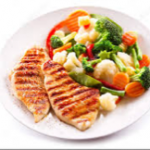
This Ramadan, our focus is on putting “Real Food” into our body. Real Food is food that is as close to its natural state as possible. Think “Food your grandmother would recognize!”
Processed food is made in a factory. An organic chicken you have to cook yourself is more real than chicken nuggets or chicken from a can.
Examples of good quality real food are:
. Good quality carbohydrates such as those found in whole grains like brown rice and quinoa.
. Good quality protein like organic eggs, beans, lentils and from animals that are raised without hormones and antibiotics.
. Good fats from nuts (like walnuts), from olives and olive oil, avocados and anchovies.
. Fibre rich foods which keep us full and give us energy coming from leafy greens, vegetables, fruits, oatmeal and bran flakes.
When you eat real foods, you minimize the chemical additives that enter your body such as artificial food coloring, preservatives, hormones and artificial flavours that your body cannot utilize and that are linked to disease and obesity.
When we eat real food our body can use it. For example, to create energy, feed our brain for focus and learning. When we eat processed foods, our body cannot use it. So it ends up stored as fat and leaves us craving more and more food. My favourite example is: think of your car. If you give it the right fuel, it will work very well. If you don’t, it will frequently stop and give you all sorts of problems.
When you put the right fuel in your body and stay committed, you start feeling better and better and if you have extra weight to shed – watch it melt away!
After a day of fasting, there is strong temptation to overindulge at Iftar. Feasting on heavy, greasy foods for Iftar will make you feel bloated, brings on indigestion and sometimes even vomiting.
How to break your fast?
- Step 1 – Rehydrate and Re-energize
- Sip on 1 cup room temperature plain water + 2 dates
Or
- Sip on 1 cup lemon water + a 1 tsp. honey or 2 dates.
- Step 2– Have a bowl of soup (vegetable, lentil, chicken – avoid heavy creamy soups).
Take a break–pray, rest, socialize
- Step 3– Your evening meal (45-60 minutes after you break your fast).
- Your meal should include ¼ protein (lentils or animal protein like chicken)
+ ½ your plate vegetables. 
Or
- ¼ whole grains like brown rice, quinoa
+ ½ your plate vegetables
Take a break – pray, rest, socialize
Then comes dessert! There are a few ways to go about handling those sugary, creamy, nutty Ramadan desserts. This doesn’t mean denying yourself nor does it mean pure indulgence. My suggestions are
- choose key days you will have dessert example during weekend invitations.
- portion – limit the portion to the size of the inside of your palm.
- Make or take a healthier desert option such as date balls or home-made cookies or cake.
- Skip sugary dessert all together and have a handful of nuts and dried fruit instead, 2 cubes of dark chocolate or fresh fruit.
- Step 4– Exercise or movement
Heavy workouts are not recommended before iftar as you are dehydrated and will be exhausted very quickly.
- If you keep your fitness classes/gym routine going, schedule it for after iftar.
- Otherwise, go for a good walk daily after iftar.
- Choose lighter forms of exercise like yoga a 3 times a week.
- Step 5– Sohour
- Have a balanced meal by midnight (portion on a small plate– or 2 hours before you sleep)
And/Or
- Have a smoothie full of hydrating fruits and vegetables like those below right before fajr prayer. These are quick to prepare, easy to digest – they are already in liquid form and are both hydrating and filling.
Try these 3 Smoothie Recipes
| Chocolate Berry Smoothie
2 cups chopped kale, ½ pitted frozen cherries or berries, ½ banana peeled & chopped, 1 tbsp. almond butter, 1 tbsp. unsweetened cocoa powder, ¼ tsp. cinnamon. When you blend add 1 cup unsweetened almond milk. |
| Pina Colada Smoothie
1 cup pineapple chunks, 1 banana, 1.5 cups spinach, 1 tbsp. chia seeds. When you blend, add ½ coconut milk & ½ water. |
| Kiwi Banana Avocado Smoothie
½ avocado, 2 kiwi fruits, 1 banana, 1.2-2 cups spinach or kale, 1 tbsp. ground flaxseed. When you blend, add 1 cup cultured yoghurt (with probiotics) and some water. |
RAMADAN AND WEIGHT LOSS
To start with, you will lose a significant amount of water weight.
If your iftar and sohour meals consist of big, heavy, and salty meals that weight will return –
Don’t break your fast with a feast!
When you focus on eating balanced meals made from clean whole foods in moderate portions, they keep you full for longer and regulate cravings. This means you will not experience extreme hunger and you get closer to the weight you would like to reach.
I’ll be posting tips and recipes throughout Ramadan. Get in touch if you still have questions or need more information at coach@healthytude.orgor book your 15-minute chat with me here.
In health,
Yasmine Defouni,
Certified Holistic Health Coach

Follow me on
